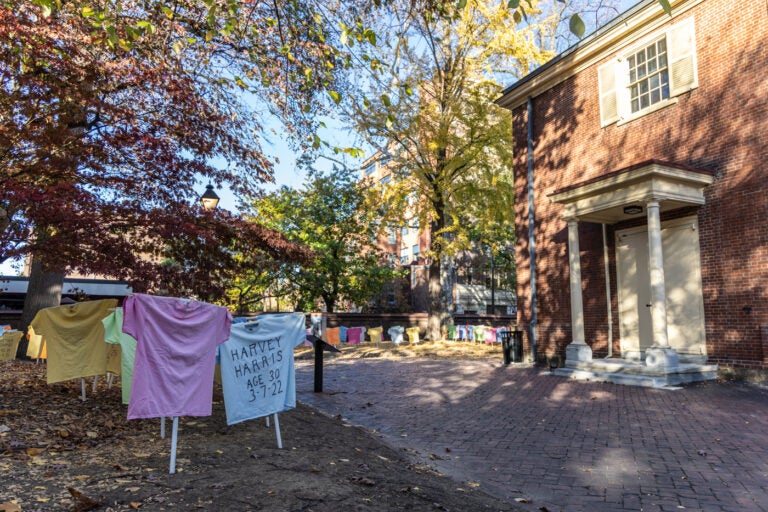Medicaid funding for gun violence programs faces scrutiny
Republican Congressman Andrew Clyde, of Georgia, unveiled the Medicaid Funds Integrity Act to restrict Medicaid funds for gun violence prevention programs.
Listen 1:17
The Memorial to the Lost installation at the Arch Street Meeting House in Philadelphia invites visitors to reflect on the people who lost their lives to gun violence and opened Nov. 8. 2024. (Kimberly Paynter/WHYY)
From Philly and the Pa. suburbs to South Jersey and Delaware, what would you like WHYY News to cover? Let us know!
Medicaid funding allocated for gun violence prevention programs is likely to face significant challenges, as some lawmakers are pushing to restrict its use and others are highlighting its potential to save American lives.
This debate follows President Biden’s executive orders from last September, which encouraged using Medicaid to support gun violence prevention through public health strategies.
The Centers for Medicare and Medicaid Services (CMS) permitted states to allocate Medicaid funds for counseling on firearm safety. So far, seven states, including California, Connecticut, and New York, have enacted legislation enabling Medicaid reimbursement for hospital-based violence intervention programs.
Pennsylvania, however, has not passed similar legislation. Still, Lieutenant Governor Austin Davis highlighted the steep financial toll of gun violence in the state in an email to WHYY News: “The total economic costs of firearm injury in Pennsylvania are estimated to be at least $300 million annually. Costs are also borne by publicly-funded healthcare systems: over five years, more than 70% of firearm injury patients had government insurance, with Medicaid covering 65%, and costs rising from $27 million in 2016 to $59 million in 2020.” His remarks draw from an interim report from Pennsylvania’s Resources for Victims of Gun Violence Initiative.
Opponents argue that using Medicaid for such programs misuses taxpayer dollars and infringes on Second Amendment rights. Congressman Andrew Clyde (GA-09) introduced the Medicaid Funds Integrity Act, to block Medicaid funds from financing gun violence prevention programs.
Rep. Clyde criticized such efforts, stating, “As responsible stewards of taxpayer dollars and relentless defenders of the Constitution, Congress must step in to stop this flagrant misuse of federal funds directed at infringing law-abiding Americans’ Second Amendment liberties.”
InterGun rights advocates echo his concerns. Aidan Johnston, Director of Federal Affairs for Gun Owners of America, argued, “Programs like this are bound to be weaponized by anti-gun administrations, which is exactly what we saw over the last four years. Gun control has nothing to do with healthcare.”
Advocates for hospital-based violence intervention programs (HVIPs) disagree. The Health Alliance for Violence Intervention (HAVI), which has championed public health-based programs for 15 years, defends Medicaid’s role in addressing gun violence and saving lives. These programs provide services for survivors of gun violence, offering resources like housing and employment assistance and food support to address the root causes of violence.
“I think there’s some confusion,” explained Executive Director Fatima Loren Dreier. “The Medicaid funds that are used to support community health workers who are employed in community and hospital settings to support people who have experienced violence.” Dreier continued, “Gunshot wound victims and others need resources like food, housing, and employment. Precisely, the kinds of resources that we want to see health care provide in order to support people’s lives.”
Hospital-based violence intervention programs and gun storage counseling initiatives are distinct efforts. While some states have begun utilizing Medicaid for various community-based interventions—such as hospital-based violence intervention services or counseling on firearm safety—organizations like the Health Alliance for Violence Intervention (HAVI) emphasize that their hospital-based programs do not include safe storage counseling. These programs instead focus on providing victims of gun violence with recovery support, mental health services, and resources for housing and employment.
In Philadelphia, hospitals such as CHOP, Penn Presbyterian, Temple, and Drexel are have adopted HVIPs but face challenges due to unstable funding streams that rely on a patchwork of institutional support, government grants, and private foundation funding. To ensure these programs can sustain and expand their life-saving efforts, Medicaid reimbursement offers a much-needed solution.
Dr. Vivek Ashok, a pediatrician in internal medicine at Children’s Hospital of Philadelphia, believes Pennsylvania should join other states in allowing Medicaid reimbursement for HVIPs. Stable funding, he insists, would expand services, treat more patients, prevent reinjury, and improve community health.
“Violence — including firearm violence — is not just a criminal justice issue but also a pressing public health crisis,” Ashok told WHYY News. “Stable Medicaid funding would not only expand the reach of these programs but also affirm our collective responsibility to address violence as a public health challenge.”
He noted a threat to Medicaid funding that prevents these programs from saving lives and breaking the cycles of violence that threaten communities.
Hospitals have a significant opportunity to promote health and safety through initiatives aimed at preventing violence. A prominent example of this commitment is the implementation of Hospital-Based Violence Intervention Programs (HVIPs), a specific type of Community Violence Intervention Program (CVIP) designed to break cycles of violence.
These evidence-informed programs not only address immediate physical and mental health needs but also target the underlying structural factors contributing to violence, such as housing instability, unemployment, lack of educational opportunities, and food insecurity, in partnership with community organizations.
By focusing on these root causes, HVIPs enhance the health and well-being of both individuals and communities. While these programs address all forms of violence, they are particularly crucial in efforts to prevent firearm violence, given its concerning prevalence.
WHYY is your source for fact-based, in-depth journalism and information. As a nonprofit organization, we rely on financial support from readers like you. Please give today.





